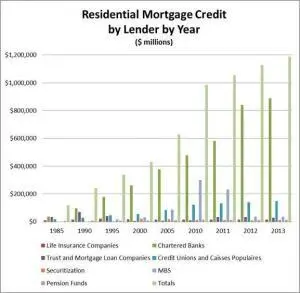Biggest residential mortgage lenders in Canada
The study of Ontario’s demographics is required to develop an understanding of the makeup of the market and its potential from the standpoint of mortgage financing. Mortgage brokers are often the best source of this information since a licensed mortgage agent, trained through the Real Estate and Mortgage Institute of Canada’s Ontario Mortgage Agent Course for licensing (RMAC) studies this information before becoming licensed.
Population
The following figure illustrates the breakdown of the Canadian population by province and territory, as of July 1, 2013. With approximately 39% of Canada’s population, the mortgage market in Ontario is the largest in Canada, representing approximately 40% of all mortgages approved in the country in 2010. Although Quebec ranks next in population, the next largest province for mortgage financing was Alberta, followed closely by British Columbia, then Quebec[2]
Figure 1 – Population and Age Distribution by Province and Territory[3]
| July 1, 2013 | |||||
| All ages | 0 to 14 | 15 to 64 | 65 and older | Median Age | |
| Canada | 35,158,304 | 16.1 | 68.6 | 15.3 | 40.2 |
| Alberta | 4,025,074 | 18.2 | 70.6 | 11.2 | 36 |
| British Columbia | 4,581,978 | 14.8 | 68.8 | 16.4 | 41.7 |
| Manitoba | 1,265,015 | 18.7 | 66.9 | 14.4 | 37.7 |
| New Brunswick | 756,050 | 14.7 | 67.7 | 17.6 | 43.9 |
| Newfoundland and Labrador | 526,702 | 14.5 | 68.4 | 17.1 | 44.2 |
| Northwest Territories | 43,537 | 21.1 | 72.8 | 6.1 | 32.4 |
| Nova Scotia | 940,789 | 14.3 | 68 | 17.7 | 43.8 |
| Nunavut | 35,591 | 30.8 | 65.7 | 3.5 | 25.4 |
| Ontario | 13,537,994 | 16.2 | 68.6 | 15.2 | 40.3 |
| Prince Edward Island | 145,237 | 15.8 | 66.9 | 17.3 | 43.1 |
| Quebec | 8,155,334 | 15.4 | 68 | 16.6 | 41.6 |
| Saskatchewan | 1,108,303 | 18.8 | 66.7 | 14.4 | 37.1 |
| Yukon | 36,700 | 16.7 | 73.4 | 9.9 | 38.9 |
Size of the Mortgage Market
As of May, 2014 the size of the Canadian mortgage market, in terms of the value of all outstanding mortgages in the county was estimated at $1.235 trillion[4]. The total residential mortgage credit outstanding in Canada has risen significantly since 1981, increasing by over 850% in 25 years.
As the following figure illustrates, lending in the mortgage market is dominated by the chartered banks, who account for nearly half of all outstanding mortgages in any given year. Credit Unions are a distant second.
Figure 2 – Residential Mortgage Credit by Lender by Year[5]

Mortgage brokering in Ontario is regulated by the Financial Services Commission of Ontario (FSCO) and requires a license. To obtain a license you must first pass an accredited course. The Real Estate and Mortgage Institute of Canada Inc. (REMIC) is accredited by FSCO to provide the course. For more information please visit us at www.remic.ca/getlicensed or call us at 877-447-3642
[2] Statistics Canada, Preliminary postcensal estimates
[3] Statistics Canada, http://www.statcan.gc.ca/pub/91-215-x/2013002/t588-eng.htm#T588FN1
[4] CMHC, Canadian Housing Observer, http://www.cmhc-schl.gc.ca/odpub/pdf/68189.pdf
[5] Statistics Canada, Residential Mortgage Credit, http://www.statcan.gc.ca/tables-tableaux/sum-som/l01/cst01/fin21-eng.htm



